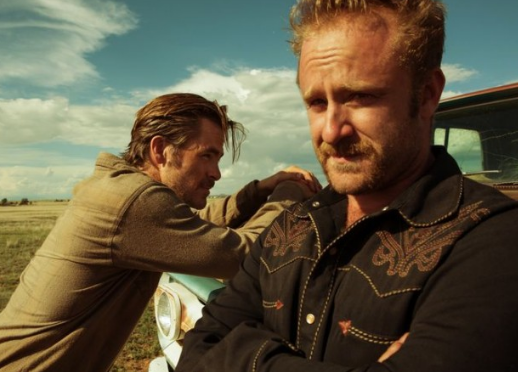“These boys is on their own.” This sentiment, expressed by “Ranger” Marcus Hamilton (Jeff Bridges) upon encountering a group of cowboys on horses wrangling their cattle away from an ever-expanding brush fire, is what best describes two of the most masculine characters rendered to screen of late, Toby (Chris Pine) and Tanner Howard (Ben Foster).
As two brothers bonded together by blood and a lust for vengeance against the bank that put a lien on their mother’s oil-rich property and gave her a loan they knew would keep her poor enough to never be able to pay them back, Toby and Tanner appear to have little in common other than a familial relation and a shared goal. But, for as different as they are, there can be no negating the love they have for one another (one that gets downplayed after each one confesses, “I love you,” followed by, “Go fuck yourself.”).
Directed by David Mackenzie (somewhat ironically Scottish rather than Texan) and written by Taylor Sheridan (following up a solid feature debut in the form of Sicario), Hell or High Water is the modern Western/bank robbery movie you didn’t know you needed. As something of a subtle extension of The Big Short, the film addresses the decay still being felt in most small towns across the U.S. in the wake of the 2008 financial crisis. For Texas, in particular, very much the representation of the quintessential American experience and population archetype, the effects of the banks’ lack of enough actual money to back the easily bequeathed subprime loans that were given willy nilly to anyone who asked appears far-reaching in every frame. The first scene in Hell or High Water juxtaposes the obsession with religion as salvation against the obsession with commerce as distraction as a middling bank worker named Elsie (Dale Dickey) walks into work against the backdrop of a more neo-Christian church located right next to a Goodyear and a store offering a closeout sale. Barely entering the door, she is accosted by Toby and Tanner in their first all-out poetic assault on Texas Midlands Bank.
After fleeing in one of the many cars they will end up burying on their ranch to throw the police off the scent, the duo robs yet another bank, per the confident, self-assured insistence of Tanner. In one of many instances of their markedly contrasting personalities, Tanner proves to be the catalyst of pure, unbridled bravado that Toby needs to sustain the courage to carry off the plan: paying back the bank with their own money to avoid foreclosure so that Toby can give the property to his two estranged sons.
Soon after the initial robbery, about-to-be-retired Hamilton is tipped off to the case by his half Native American, half Mexican partner, Alberto (Gil Birmingham), who shares a special sort of derisive banter with him that consists of such mutual racist jokes as Hamilton bragging, “Call it white man’s intuition” and Alberto retorting, “Even a blind pig finds a truffle once in a while.”
To be sure, it is these small touches in dialogue that enhance the distinct Texan feel of the movie. Most memorably, a decrepit waitress at a rinky dink restaurant called the T-Bone Cafe in the town of Coleman steals the show with her line, “What don’t you want?” Hamilton and Alberto, in the process of killing time while waiting for Tanner and Toby to strike at the nearby bank, look at her skeptically. She clarifies, “Only person who ever ordered something besides a steak was some asshole from New York who asked for trout back in 1987. So, what don’t you want? Green beans or mashed potatoes?”
The careful attention to detail that adds to the desperation and desolation of these, essentially, ghost towns is enhanced by the omnipresence of billboards demanding simply, “DEBT?” Putting none too fine a point on the unreachability of the so-called American dream for most people, Hell or High Water is about far more than just Chris Pine’s matinee idol good looks or Nick Cave and Warren Ellis’ score, which will inspire you to go to a saloon and drink Shiner. It’s about the irrevocability of one’s station in life, how it starts out from the womb and spreads over time.
With a major fallout by the end of Hell or High Water, a now officially retired Hamilton has to know the reason behind the losses incurred during the pursuit of Tanner. Holding a shotgun, Toby calmly explains, “I’ve been poor my whole life. So was my family, generations before me. It’s like a disease.” But, if you’re willing to go outside the system–and with a little brotherly love–maybe, just maybe, you can avoid the perpetual cycle of financial mediocrity.





















